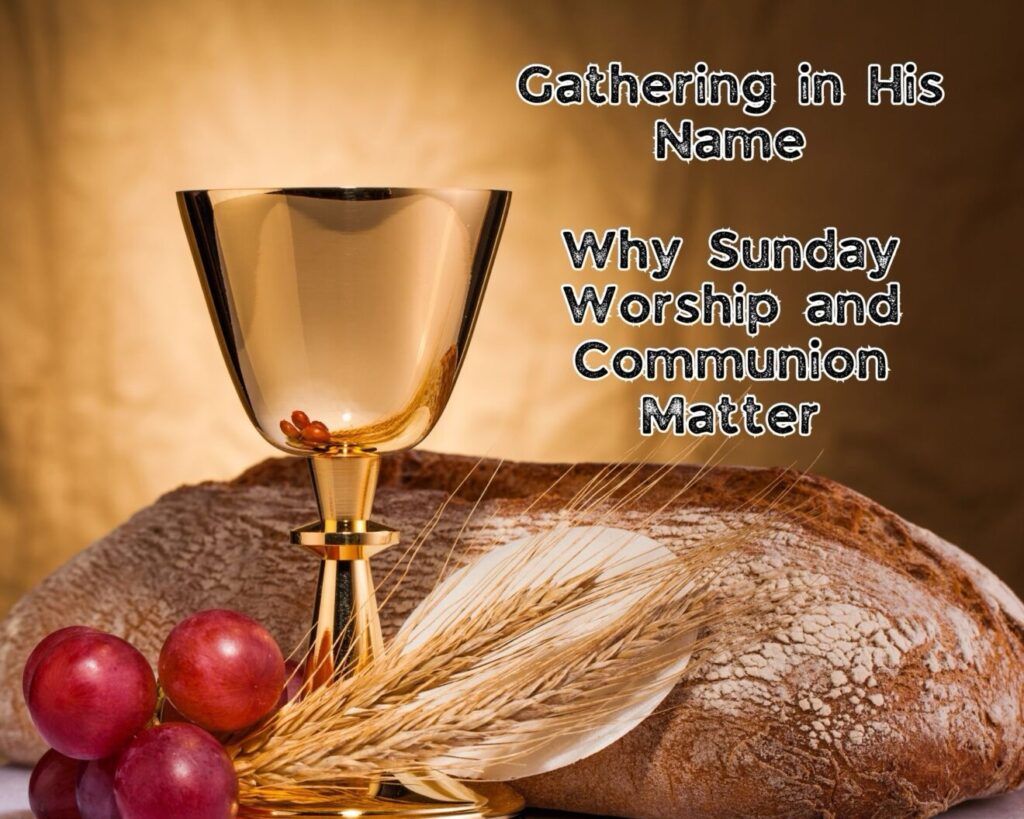Christianity, a faith with billions of followers worldwide, is rich with diversity. This diversity is expressed through various denominations, each with unique interpretations of the Bible, traditions, and practices. Understanding these denominations can be essential for anyone on a journey of faith, seeking to find a community that aligns with their personal beliefs and values.

When exploring Christianity, it’s crucial to recognize that all denominations share core beliefs about Jesus Christ and His teachings. However, the differences in interpretation and practice can be significant. For many, these differences are pivotal in determining where they feel most spiritually fulfilled.
One denomination stands out with a profound claim: the Church of Christ. Unlike other denominations that were established centuries after Christ’s ministry, the Church of Christ asserts its foundation directly by Jesus Christ Himself. This church is distinguished not only by its historical roots but also by its commitment to adhering strictly to New Testament teachings.
As you embark on this exploration, keep in mind the importance of aligning with a denomination that supports your spiritual growth, community involvement, and personal convictions. The journey may be challenging, but understanding the unique aspects of each denomination will help you find your spiritual home.

Understanding Core Beliefs
At the heart of Christianity are core beliefs that unite all denominations, despite their differences. These fundamental beliefs include the divinity of Jesus Christ, His resurrection, and the salvation offered through His sacrifice. These shared tenets form the foundation of the Christian faith and provide a common ground for all believers.
However, how these beliefs are interpreted and practiced can vary significantly across denominations. For instance, the understanding of the sacraments, the nature of the Trinity, and the authority of scripture can differ. These differences often lead to the formation of distinct denominations, each with its unique emphasis and practices.

For those new to Christianity, a How to Be a Christian Starter Guide can be incredibly helpful in understanding these core beliefs and how they are lived out in daily life. This guide can provide a foundational understanding and help in navigating the various denominations.
The importance of understanding these core beliefs cannot be overstated. They not only define the faith but also influence personal spirituality and community life. Knowing what each denomination emphasizes can help you align with a community that supports and nurtures your spiritual journey.

Major Christian Denominations
Christianity encompasses a broad spectrum of denominations, each with its own unique beliefs, practices, and historical backgrounds. The three major branches of Christianity are Catholicism, Protestantism, and Orthodoxy, each contributing significantly to the faith’s rich tapestry.
Catholicism Catholicism is the largest Christian denomination, with the Pope serving as its spiritual leader. The Catholic Church emphasizes the authority of the Pope, the importance of church traditions, and the seven sacraments, which are seen as essential means of grace. Catholics also venerate saints and believe in the intercession of the Virgin Mary.
Protestantism Protestantism emerged from the Reformation in the 16th century, challenging various doctrines and practices of the Catholic Church. It is not a single denomination but a collection of numerous denominations, including Baptists, Methodists, Lutherans, and Presbyterians. Protestants generally emphasize the authority of Scripture over church tradition and the belief in salvation by faith alone.
Orthodoxy The Orthodox Church, often referred to as Eastern Orthodoxy, is known for its continuity with the early church. It emphasizes the importance of maintaining the traditions and liturgies that date back to the first centuries of Christianity. The Orthodox Church is decentralized, with national churches led by bishops, all in communion with one another.
The Church of Christ Distinct from these branches is the Church of Christ, which claims a direct establishment by Jesus Christ Himself. Unlike other denominations that were created centuries after Christ’s ministry, the Church of Christ seeks to restore the New Testament church’s original form and teachings. It emphasizes strict adherence to the teachings of the New Testament, rejecting man-made doctrines and creeds.
Understanding these major denominations provides a framework for exploring the diversity within Christianity. Each branch has its strengths and unique perspectives, contributing to the faith’s richness. However, the Church of Christ stands out for its claim of being the one true church, established by Christ and rooted in the New Testament.

The Church of Christ: The One True Church
The Church of Christ stands apart from other Christian denominations due to its claim of being the one true church established by Jesus Christ. Unlike denominations that were founded centuries later, the Church of Christ traces its origins directly to the New Testament, striving to restore the original teachings and practices of the early Christian church.
Historical Background and Establishment The Church of Christ believes that Christ Himself established the church, as noted in Matthew 16:18, where Jesus says to Peter, “And I tell you that you are Peter, and on this rock I will build my church, and the gates of Hades will not overcome it.” This verse is foundational to the Church of Christ’s identity, underscoring its belief in being the true continuation of the church that Jesus founded.
Key Beliefs and Practices The Church of Christ is characterized by its strict adherence to the New Testament. It rejects creeds and doctrines created by humans, focusing instead on the Bible as the sole source of authority. Worship in the Church of Christ is simple and unembellished, featuring a cappella singing, prayers, communion, and preaching. Baptism by immersion for the forgiveness of sins is a critical practice, as supported by Acts 2:38: “Peter replied, ‘Repent and be baptized, every one of you, in the name of Jesus Christ for the forgiveness of your sins. And you will receive the gift of the Holy Spirit.’”
Biblical Support for the Church of Christ The Church of Christ grounds its beliefs and practices in the Bible, particularly the New Testament. The emphasis on biblical authority is evident in its commitment to following the examples and instructions of the early church. For instance, Acts 2:42 highlights the early Christians’ devotion to “the apostles’ teaching and to fellowship, to the breaking of bread and to prayer.” This verse reflects the core activities of the Church of Christ.
Reasons to Consider the Church of Christ
- Biblical Foundation: The Church of Christ’s commitment to adhering strictly to New Testament teachings offers a sense of authenticity and connection to the early church.
- Simplicity of Worship: Worship services are straightforward, focusing on genuine worship rather than entertainment. This approach fosters a deep sense of reverence and community.
- Emphasis on Baptism: The Church of Christ places significant importance on baptism by immersion, viewing it as essential for salvation. For more insights, you can explore Surprising Facts About Church of Christ Baptism.
The Church of Christ’s focus on returning to the Bible and maintaining the practices of the early church provides a unique and compelling option for those seeking an authentic Christian experience rooted in scripture.

Sub-Denominations and Their Characteristics
Within Christianity, the major branches of Catholicism, Protestantism, and Orthodoxy further divide into numerous sub-denominations, each with unique beliefs and practices. Understanding these sub-denominations can help you find a community that aligns with your personal faith journey.
Catholic Sub-Denominations
- Roman Catholic Church: The largest within Catholicism, led by the Pope in Rome. It emphasizes the sacraments, veneration of saints, and adherence to church traditions.
- Eastern Catholic Churches: These churches are in full communion with the Pope but follow Eastern liturgical traditions. They include the Maronite, Byzantine, and Coptic rites, among others.
Protestant Sub-Denominations
- Baptists: Emphasize believer’s baptism by immersion and the authority of Scripture. Worship services are often simple and focus on preaching and congregational singing.
- Methodists: Known for their emphasis on social justice, sanctification, and the methodical approach to faith (hence the name). They practice open communion and infant baptism.
- Lutherans: Follow the teachings of Martin Luther, emphasizing justification by faith alone and the importance of sacraments such as baptism and the Eucharist.
- Presbyterians: Governed by a system of elders (presbyters), they emphasize predestination and the sovereignty of God in salvation.
- Pentecostals: Known for their vibrant worship and belief in the gifts of the Holy Spirit, including speaking in tongues and divine healing.
Orthodox Sub-Denominations
- Greek Orthodox Church: Follows the traditions and liturgies of the early Eastern Church. It emphasizes the continuity of Holy Tradition and the sacraments.
- Russian Orthodox Church: Similar to the Greek Orthodox, but with distinct liturgical practices and cultural influences.
- Coptic Orthodox Church: One of the oldest Christian communities, primarily in Egypt, with a unique liturgy and emphasis on monasticism.
Non-Denominational Churches
- These churches often eschew traditional denominational labels, aiming to return to what they see as the simple, early Christian model of church organization and practice. They often emphasize personal faith and direct relationship with Jesus Christ without the intermediary of traditional church structures.
Church of Christ Sub-Denominations
- While the Church of Christ generally strives for unity based on New Testament teachings, there are variations within its fellowship. Some congregations may differ slightly in worship styles or specific practices but all adhere strictly to the Bible as their authority. To better understand these nuances, consider exploring resources like Gathering in His Name: Why Sunday Worship and Communion Matter.
Understanding the characteristics of these sub-denominations helps in finding a community that fits your spiritual needs and beliefs. Each offers a unique perspective on faith and practice, contributing to the rich diversity of Christianity.

Why You Should Go to Church
Attending church is a vital aspect of Christian life, offering numerous spiritual, emotional, and communal benefits. It’s not just about fulfilling a religious obligation; it’s about fostering a deeper relationship with God, building a supportive community, and growing spiritually.
Spiritual Growth and Community Church provides a structured environment for worship, study, and prayer, helping individuals grow in their faith. Regular attendance encourages a deeper understanding of biblical teachings and offers opportunities for communal worship and support. As Hebrews 10:25 reminds us, “not giving up meeting together, as some are in the habit of doing, but encouraging one another—and all the more as you see the Day approaching.”
Biblical Reasons for Church Attendance The Bible underscores the importance of gathering together. In Matthew 18:20, Jesus says, “For where two or three gather in my name, there am I with them.” This verse highlights the spiritual presence and unity found in communal worship. Additionally, Acts 2:42-47 describes the early church’s practices, including teaching, fellowship, breaking of bread, and prayer, which are central to Christian worship today.
Genuine Worship vs. Entertainment In a world where entertainment often takes center stage, genuine worship can sometimes be overlooked. Church should not be about spectacle or personal enjoyment but about honoring and glorifying God. True worship involves heartfelt praise, prayer, and a focus on God’s word. This is particularly emphasized in the Church of Christ, which strives for a simple, sincere approach to worship that avoids the trappings of entertainment.
The Role of the Church of Christ The Church of Christ emphasizes the importance of genuine worship and community. By adhering strictly to New Testament teachings, the Church of Christ seeks to create an environment where worship is pure and focused on God. This approach helps believers grow in their faith without the distractions of modern entertainment.
To explore more about the significance of church gatherings and the biblical foundation for practices like Sunday worship and communion, you can read Gathering in His Name: Why Sunday Worship and Communion Matter.
Community Support and Accountability Being part of a church community provides emotional and spiritual support. It offers a network of fellow believers who can offer encouragement, prayer, and practical help. This sense of community can be crucial during times of personal struggle or spiritual doubt.
Opportunities for Service and Ministry Church attendance opens up numerous opportunities to serve others. Whether through participating in church ministries, volunteering, or simply being a supportive member of the congregation, these acts of service are ways to live out your faith in practical, impactful ways.
Prayer and Connection with God Regular church attendance encourages a disciplined prayer life. Praying with others and for others in a church setting helps build a stronger, more consistent connection with God. For more insights on the power of prayer and its biblical foundations, check out Why Pray in Jesus’ Name: Unlocking Biblical Truths.
Attending church is essential for maintaining a healthy, vibrant faith. It’s a place for spiritual growth, genuine worship, community support, and service. The Church of Christ, in particular, provides an environment focused on biblical teachings and true worship, helping believers stay rooted in their faith.

Living Out Your Faith
Living out your faith extends beyond attending church services; it involves integrating Christian principles into every aspect of daily life. This holistic approach to faith helps believers grow spiritually, strengthen their relationship with God, and positively impact those around them.
Practical Applications of Faith in Daily Life Living as a Christian means embodying the teachings of Jesus in actions, words, and attitudes. This includes showing love and kindness to others, practicing forgiveness, and living with integrity. The Bible offers guidance on how to apply faith in various aspects of life, encouraging believers to be “doers of the word, and not hearers only” (James 1:22).
Importance of Prayer and Its Biblical Foundations Prayer is a vital component of a Christian’s daily life. It is a means of communicating with God, seeking His guidance, and expressing gratitude. The Bible instructs believers to “pray without ceasing” (1 Thessalonians 5:17), emphasizing the importance of maintaining a constant dialogue with God. Praying in Jesus’ name is particularly powerful, as it aligns prayers with God’s will and purpose. For a deeper understanding, refer to Why Pray in Jesus’ Name: Unlocking Biblical Truths.

Financial Stewardship and Biblical Teachings on Money Managing finances in a way that honors God is an essential aspect of living out your faith. The Bible offers numerous teachings on debt, generosity, and stewardship. Proverbs 22:7 warns, “The rich rule over the poor, and the borrower is slave to the lender,” highlighting the importance of wise financial management. For more insights on this topic, explore Biblical Teachings on Debt and Money Management.
Serving Others and Community Involvement Christianity calls for active service to others. This can be through volunteering at church, helping those in need, or engaging in community projects. Acts of service reflect the love of Christ and fulfill the biblical mandate to “serve one another humbly in love” (Galatians 5:13). The Church of Christ encourages its members to live out their faith through tangible actions, emphasizing the importance of community involvement.
Giving and Generosity Generosity is a fundamental Christian virtue. Giving to the church, supporting charitable causes, and helping those in need are ways to practice generosity. This not only helps others but also cultivates a spirit of selflessness and gratitude. The Bible encourages cheerful giving, as stated in 2 Corinthians 9:7: “Each of you should give what you have decided in your heart to give, not reluctantly or under compulsion, for God loves a cheerful giver.”
Building Relationships and Witnessing Living out your faith involves building meaningful relationships and sharing the gospel with others. Witnessing to friends, family, and coworkers about the love of Christ and the message of salvation is an essential part of the Christian life. The Great Commission in Matthew 28:19-20 instructs believers to “go and make disciples of all nations,” underscoring the importance of evangelism.
Personal Devotion and Study Regular personal devotion and study of the Bible are crucial for spiritual growth. Spending time in God’s word and reflecting on its teachings help deepen understanding and strengthen faith. Resources like the How to Be a Christian Starter Guide can provide valuable insights and guidance for new believers and those looking to renew their commitment to their faith.
Living out your faith is a continuous journey that encompasses all aspects of life. It involves daily practices, such as prayer and Bible study, wise financial stewardship, generous giving, and active service to others. By integrating these principles into daily life, believers can grow spiritually and make a positive impact on their communities.

Personal Beliefs and Preferences
It is important to know that we may have our own thoughts and ideas in our head, or guide ourselves just from what we may of heard, however what is more important is what the Bible asks of us and what the Bible commands us to do. We should not go to church because they give cool prizes and have love bands playing. We should go to a true church that follows what the Bible says, like the Church of Christ, you know, the one established by Jesus.
Finding a church that aligns with your personal beliefs and preferences is crucial for spiritual growth and satisfaction. Each Christian denomination and sub-denomination has unique doctrines, worship styles, and community practices. Reflecting on what resonates with you can help you find a spiritual home that nurtures your faith journey.
Reflecting on Personal Beliefs and Values Begin by considering your core beliefs and values. What are your non-negotiables in terms of doctrine? For example, how important is the mode of baptism, the role of communion, or the interpretation of scripture to you? Understanding your foundational beliefs can guide you in choosing a denomination that aligns with your convictions.

Importance of Worship Style Worship style is another significant factor to consider. Some people prefer traditional liturgical services with hymns and structured rituals, while others may find contemporary worship with modern music and informal settings more meaningful. The Church of Christ, for instance, emphasizes a cappella singing and simple, scripture-based services, which may appeal to those who value simplicity and tradition in worship. For more on the role of music in worship, check out Singing from the Soul: Understanding the Role of Music in Worship.
Community and Fellowship The sense of community and fellowship within a church can significantly impact your experience. Do you prefer a close-knit congregation where everyone knows each other, or are you more comfortable in a larger church with diverse programs and ministries? The Church of Christ often fosters a strong sense of community, encouraging members to engage deeply with one another through various activities and support systems.
Doctrine and Teaching Consider how the church approaches doctrine and teaching. Are the sermons and teachings rooted firmly in scripture? Is there an emphasis on personal Bible study and application? The Church of Christ places a strong emphasis on biblical teaching and encourages members to study the Bible diligently. This focus on scripture can provide a solid foundation for your faith and personal growth.
Tools for Self-Reflection To aid in this process, various tools and resources can help you reflect on your beliefs and preferences. Quizzes, counseling sessions with church leaders, and discussions with fellow Christians can provide insights into what you seek in a church. For instance, exploring Christian Gifts for Women: Unique and Meaningful Ideas can also reveal how a church supports and nurtures specific groups within the congregation.
Cultural and Regional Influences Cultural and regional factors can also play a role in your choice. Churches may reflect the cultural values and traditions of their communities, which can be comforting and familiar or offer a new perspective and experience. Understanding these influences can help you find a church environment where you feel at home.
By thoughtfully considering your personal beliefs, worship preferences, and community needs, you can find a church that not only aligns with your faith but also supports your spiritual journey. The Church of Christ, with its emphasis on New Testament teachings and simple, genuine worship, offers a compelling option for many believers.

As an Amazon Associate we earn from qualifying purchases through some links in our articles.



